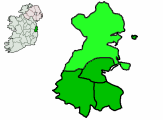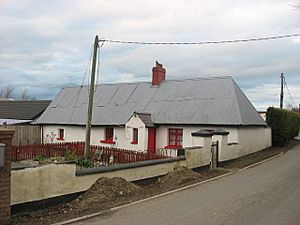Fingallian facts for kids
Quick facts for kids Fingallian |
|
|---|---|
| Fingallian | |
| Native to | Ireland |
| Region | Fingal |
| Extinct | Mid-19th century |
| Language family |
Indo-European
|
| Early forms: |
Proto-Indo-European
|
Fingallian, or the Fingal dialect, was a special kind of English spoken a long time ago in a part of Ireland called Fingal. It is now an extinct language, meaning no one speaks it anymore. Experts believe it came from Middle English, which arrived in Ireland when the Normans invaded in the 1100s. By the mid-1800s, Fingallian had disappeared. It was thought to be similar to another old English dialect from County Wexford, called the Forth and Bargy dialect.
We don't have many writings in Fingallian. The few pieces that exist are two funny poems: a short one called "Fingallian Dance" and a much longer one named Purgatorium Hibernicum. Both poems were written by people who probably didn't speak Fingallian as their first language. They were meant to be humorous parodies, so they might not show the language exactly as it was spoken.
Contents
The Story of Fingallian
Fingallian was spoken in the region of Fingal, which is the part of County Dublin north of the River Tolka. The name "Fingal" comes from the Irish words Fine Gall, meaning "territory of foreigners." This likely refers to a Norse settlement that was once in the area. One linguist, Alf Sommerfelt, thought Norse languages might have influenced Fingallian, but later studies haven't found proof of this.
Like the Yola dialect spoken in County Wexford, Fingallian is believed to have developed from Middle English. This version of English was brought to Ireland by settlers known as "Old English" after the Norman invasion of Ireland in 1169. Middle English was common in southeastern Ireland until the 1300s. Then, the area became more Irish-speaking again, and English was used less. Because of this, the Yola and Fingal dialects were the only known remaining examples of this early English in Ireland.
The Fingallian Dance Poem
The poem most likely written by someone who spoke Fingallian is The Fingallian Dance. It's a short poem with only three stanzas, written around 1650 to 1660. The poem describes a person going to watch dancers at a bullring. Bullfighting was a practice in Ireland during the 1600s. Even though the poem might have been changed a bit when it was written down, it gives us an idea of what Fingallian sounded like. For example, it uses words like fat for "what" and fen for "when."
Purgatorium Hibernicum Poem
The Purgatorium Hibernicum is a funny, exaggerated version of the Roman poet Virgil's famous poem, Aeneid. There are three different versions of this work. The first is the original handwritten copy. Another handwritten copy from 1670–1675 is called The Fingallian Travesty: the Sixt Book of Virgill's Aenoeids a la mode de Fingaule. Finally, a printed version from 1689 is known as The Irish Hudibras or The Fingallian Burlesque.
What People Said About Fingallian
In a book called Letters from Ireland (1698), John Dunton wrote about the people in Fingal. He said they had "a sort of jargon speech peculiar to themselves." He also noted that they didn't understand a single word of Irish, and English speakers found it hard to understand them too. Dunton even included an example of the language. It was a lamentation, a sad song, that a mother sang for her son who was a good fisher and hunter.
Modern Fingal English Words
Even though the old Fingallian language is no longer spoken, many unique words from its dialect have survived. You can still hear these words, especially in traditional Fingal towns and villages. Some of these places include Swords (which is now a large suburb of Dublin), Skerries, Rush, Lusk, Donabate, Garristown, Oldtown, Balrothery, Portrane, and Naul.
Two important sources for these words are glossaries (lists of words and their meanings). One is in an article by J. J. Hogan and Patrick O'Neill in the folklore journal Béaloideas. The other is in a book about Fingal traditions called Fair Fingall by Patrick Archer.
Here are some examples from Archer's Glossary:
- Cinnit (pronounced with a hard 'C') – a person who tries to trick others
- Cloustered – covered up in clothes
- Dalk – a thorn (from the Irish word dealg)
- Dawney – delicate or weak
- Lawneyday – an expression of surprise or regret (from the Irish Láine Dé)
- Mullacking – working or walking in mud
- Possing – soaking wet
- Rossie – a strong, loud woman
- Scut – a short, mean person, or a wren (a small bird)
Here are some examples from Hogan and O'Neill's Glossary:
- Barney – a quarrel or a fight
- Bunched – ruined or finished
- Buthoon – a bad mistake (from the Irish Botún)
- Clift – a sensible person who has done something silly
- Cobby – clever and experienced in the world
- Dugging – poking or punching someone, fighting
- Foopah – a mistake (from the French faux pas)
- Gollockers – eyes (used in a disrespectful way)
- Go-boy – a sneaky person who secretly causes trouble
- Launa-wallya – something important to think about, like "a bellyful" (from the Irish Lán a' mhála, meaning 'bagful')
- Malavogue – to beat or hurt someone badly
- Moggy – a fat, lazy person
- Randyvoo – a house where people meet to chat or cause mischief (from the French rendez-vous)
- Raucie – a girl who likes to wander around
- Simmy-saumy – a foolish-looking person
- Squib – a word used to talk to a stranger, especially a boy (for example, 'hey, squib')
- Tamboo – a shebeen (an illegal pub), or a house that looks very poor
- Whack – nothing or nobody (from the Irish faic)
See also
 | William Lucy |
 | Charles Hayes |
 | Cleveland Robinson |



